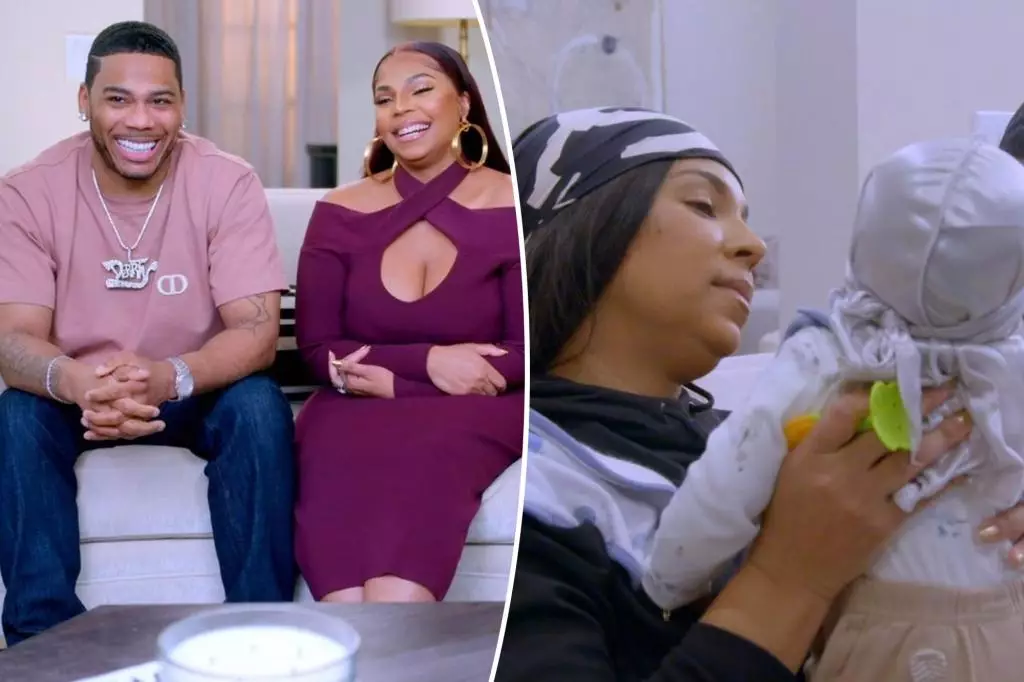In a recent episode of the reality series *Nelly & Ashanti: We Belong Together*, the rapper Nelly candidly expressed his outright refusal to change diapers for his infant son Kareem. At 50 years old, Nelly’s stance—declaring that diaper duty is strictly his wife Ashanti’s responsibility—has stirred considerable controversy and raised critical questions about modern fatherhood, shared parenting, and societal expectations. His dismissal of this essential form of childcare not only sparked online backlash but also exposed a deeper issue concerning how some fathers navigate their roles in parenting.
While Nelly framed his position humorously and with a dose of bravado, his comments reveal a deeper dissonance in co-parenting duties. When Ashanti called on him to take over nighttime care, his response—“It’s all you, I ain’t got nothing for him”—was met with frustration and resignation from Ashanti, who openly shared how overwhelming the early stages of parenthood had been for her. The imbalance was palpable, and it ignited fierce debates about the implications of one parent opting out of hands-on childcare, especially during the most demanding phase: infancy.
The Weight of Primary Caregiving Falls Disproportionately
Ashanti’s honest admission that caring for their nearly one-year-old son is “a lot” and that she often feels alone in the task strikes a chord with many parents familiar with the exhausting reality of raising young children. The physical, emotional, and mental tolls during this phase can be immense, and the call for equitable sharing of responsibilities cannot be overstated.
Nelly’s argument—that the responsibility should stay mostly with Ashanti until Kareem can communicate his needs and move around independently—reflects an outdated, and frankly frivolous, interpretation of fatherhood. Relying heavily on nannies, as Nelly explained in a follow-up interview, may ease some pressure, but it does not address the fundamental issue: the emotional labor and everyday hands-on engagement that foster parent-child bonding and relieve maternal burnout.
Many modern families strive toward partnership in caregiving, recognizing that hands-on involvement from both parents during infancy is crucial—not only for the child’s development but also for the well-being of both parents. When one parent opts out of such basic yet vital duties, the other is left to bear the brunt, leading to feelings of resentment and isolation, a phenomenon too often hidden behind social media glitz and celebrity facades.
Public Backlash and the Reality of Fatherhood Expectations
The social media storm following the aired clip was fierce and pointed. Many criticized Nelly for what they saw as shirking paternal responsibility. Comments branding Ashanti a “married single mom” highlight the frustrations of observers who recognize that, despite being a couple, equitable parenting is far from reality in many households.
Such backlash is revealing because it underscores evolving cultural norms around fatherhood. In today’s context, fathers are increasingly expected to be active participants, not just financial providers or background figures. Consequently, Nelly’s candid unwillingness to engage in nighttime diaper changes is viewed by many as emblematic of lingering patriarchal attitudes that assign child-rearing almost exclusively to mothers.
This divergence between evolving societal expectations and ingrained behaviors presents a significant challenge. It forces a confrontation with how men perceive their roles in the family and how those perceptions affect both their partners and children.
Nelly’s Parenting Context: Privilege and Responsibility
It is important to consider Nelly’s personal history and circumstances in this discussion. He is the father of four grown children and has experienced various parenting realities, including adopting two siblings after a family tragedy. That background suggests a complex relationship with fatherhood, yet doesn’t excuse his current stance.
His acknowledgment of paying for nannies indicates access to financial resources that many parents lack. While providing financially is an essential part of parenting, it should not be confused with the comprehensive demands of raising a child, especially in the crucial infant stages. By outsourcing the hands-on care but not equally participating, there is a risk of undermining the emotional connections that form the foundation of fatherhood.
Ultimately, Nelly’s open declaration against diaper duty serves as a mirror reflecting larger cultural questions: Are fathers ready to embrace the full spectrum of parenting? Will modern fatherhood mature beyond just provision and occasional involvement into genuine, consistent partnership? This episode may well be a snapshot of where some fathers stand but also a call to action for the many who seek to redefine what it truly means to be a dad in the twenty-first century.

